As we inch closer and closer to the GLAAD Media Awards on March 14 and the 96th Academy Awards on March 10, there have been numerous awards ceremonies in film and TV. Last week and through the weekend Hollywood had a plethora of ceremonies including the African American Critics Association (AAFCA) Awards, the Screen Actors (SAG-AFTRA) Awards, the Film Independent Spirit Awards, the Producers Guild of America (PGA) Awards, and many others.
For those outside of the Hollywood bubble, this avalanche of awards ceremonies may feel a little excessive, but these ceremonies are like the playoffs before the big game — which is the Oscars. The numerous ceremonies are benchmarks and indicators of who is likely to win gold at the Academy Awards.
This year’s awards season was populated with many LGBTQ actors, characters, and narratives in film and TV with projects like Andrew Haigh‘s All of Us Strangers and actors like Ayo Edebiri who has slayed the competition with her role in The Bear. The actress most recently received the SAG Award for the popular FX series (presented to her by Billie Eilish and Melissa McCarthy) and Bottoms was nominated at the Indie Spirit Awards. The SAG Awards also honored queer icon Barbra Streisand with the Lifetime Achievement Award and gave a drunk Pedro Pascal a trophy for The Last of Us.
Netflix’s Rustin, which puts a spotlight on the titular overlooked civil rights leader Bayard Rustin and the March on Washington, has been a strong awards season contender with director George C. Wolfe and actor Colman Domingo leading the charge (read our interview with them here). On February 21, the Roy Wood, Jr.-hosted AAFCA Awards bestowed Wolfe with the Legacy Award while Domingo, who also earned an Oscar nod, was honored with the Best Actor award.
Oscar-nominated and Indie Spirit award-winning American Fiction actor Jeffrey Wright presented Wolfe with the award. The pair had worked previously on the original Broadway production of Angeles in America which included Wright’s Tony-winning performance of the iconic queer character Belize (a role he reprised in the 2003 HBO limited series –which won him an Emmy).
After cracking a joke about Wright not hitting his mark back in Angels in America days, Wolfe praised him as an actor and went on to say one of his favorite Russian proverbs: “You must support talented people because untalented people will make it without your support.”
“I’m really honored but the real joy of my life is going into the room with brilliant, passionate, hard-working probably a little bit crazy artists and they give everything they have and you talk and you engage,” He said. Wolfw then joked, “I feel that way about most of the people that I’ve worked with. There are a few but there’ll be in the book, you’ll read that.”
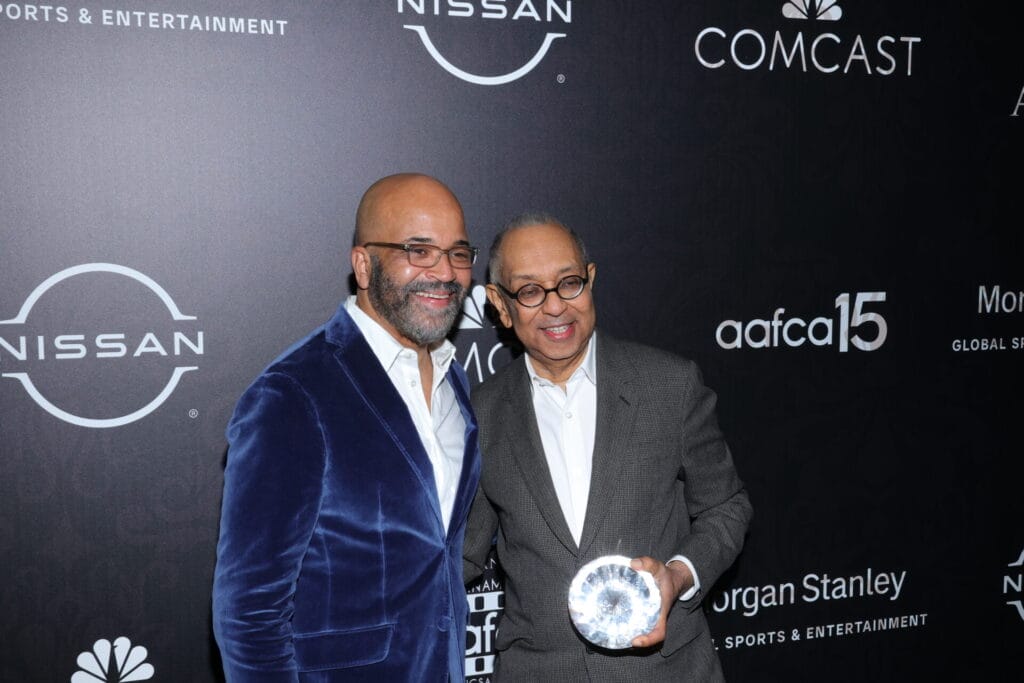
(Photo credit: Arnold Turner/Eclipse Content/aafca)
He turned his attention to Domingo, who was in the audience: “I believe it is a source of joy to cast Colman Domingo in a role so the entire world can see what an astonishing artist he is. That’s joy.”
“It is all of our jobs if we achieve any level of responsibility to shatter resistance because that person who you are in the room; that person who you are nurturing that person who you are giving time and energy could very well save a moment in a play that could very well save our country could very well save a planet,” Wolfe stated. “We are servants of humanity and it is our job all of our jobs to do the best, [purest] version of what we do — be it acting, writing, healing — whatever it is because there are many, many, many dark forces out there and as long as there is art, and as long as we are digging into history and as long as we are celebrating those people who came before who frequently had to fight to be called human… we must do it because the forces are gathering — but so what? So is the art. So is the truth. Thank you very much.”
View this post on Instagram
Domingo returned the favor and praise during his acceptance speech at the AAFCA Awards. “This portrayal of Bayard Rustin is actually three men and that is my director George C. Wolf,” he declared, turning his attention to him in the audience. “All the heart, humanity and interrogation, and work ethic that he demands — I appreciate you for that. It’s also, Bayard Rustin, an unsung American hero….when I watch them work, I see three men work. I see us live on the shoulders of one another and we’re helping each other tell our stories, and to make sure that we own our power.”
Domingo continued, “We stand in rooms that don’t actually invite us in and we stand strong with our intelligence and our wit and our sexuality and our humor and our humanity. We demand that you see all of us together. Thank you so very much George for giving me the opportunity of my lifetime — to tell by Bayard’s story so people will always know who Bayard Rustin is.”
He went on to say that he wants us to not only put the spotlight on unsung heroes like Rustin but also the Diane Nashes, A. Philip Randolphs, and “all these other ordinary human beings trying to do something extraordinary” to “make the world a better place.”
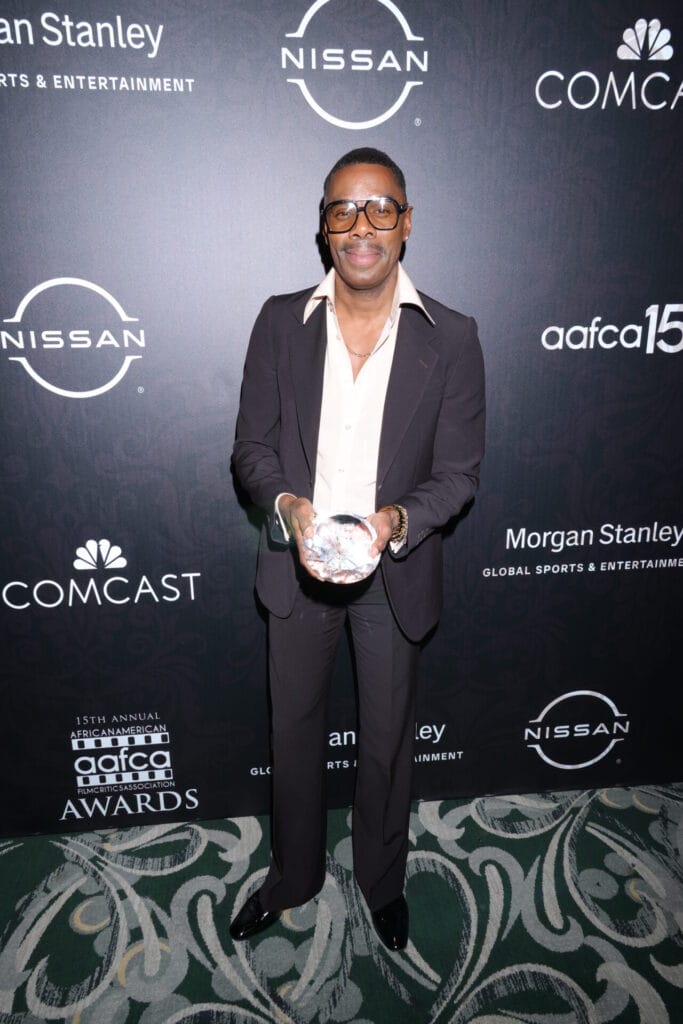
Delivering a sermon that everyone was soaking in, Domingo concluded, “This phenomenon truly is a clarion call to all of us right now to take part in our democracy; to not feel like that is futile that we don’t have a choice or an opportunity but we can just do something small. It is nothing but just saying hi and hello, and expressing something human to the person that you don’t even know, and like George has said… it’s one of the most profound things that stays with me on this whole ride of getting Rustin and out to the world: ‘It doesn’t have to look like you to be about you.'”
Aunjanue Ellis-Taylor was honored with AAFCA’s Best Actress award for her role in the overlooked film Origin, Ava DuVernay‘s bold adaptation of Isabel Wilkerson‘s book Caste: The Origins of Our Discontents. The film thoughtfully explores and interrogates the bridges that connect the caste system, class, and racism. Ellis-Taylor, who deserves recognition for the role, made sure to pay it forward by praising fellow AAFCA winner DuVernay.
“Dear Ava, we often bemoan interruptions, the paths we are on daily that soothe us and comfort us,” Ellis-Taylor said via a pre-recorded message. “Our rituals and routines we dare not deviate from them.. and then you came crashing into my life. Exploding banality and fear and putting me on a path of the unexpected and the mind-breathing body will only be a memory but my gratitude for what you made happen in my life, just like her brilliant work, will live as long as they are rituals like setting art made from courageous hearts. Thank you to my tremendous, outstanding brilliant director and this wonderful organization that always encourages me. Thank you so much.”
Oscar-nominated Killers of the Flower Moon actress Lily Gladstone had a good weekend, winning a SAG Award for Outstanding Performance by a Female Actor in a Leading Role and being honored by AAFCA. When Gladstone makes an acceptance speech, you’re going to learn a lot within her allotted time. Misty Copeland presented her with the Breakout Performance award and during her speech we found out that she was once a ballerina and that Maria Tallchief, a woman from the Osage nation, was considered America’s first prima ballerina and was married to George Balanchine of the New York City Ballet.
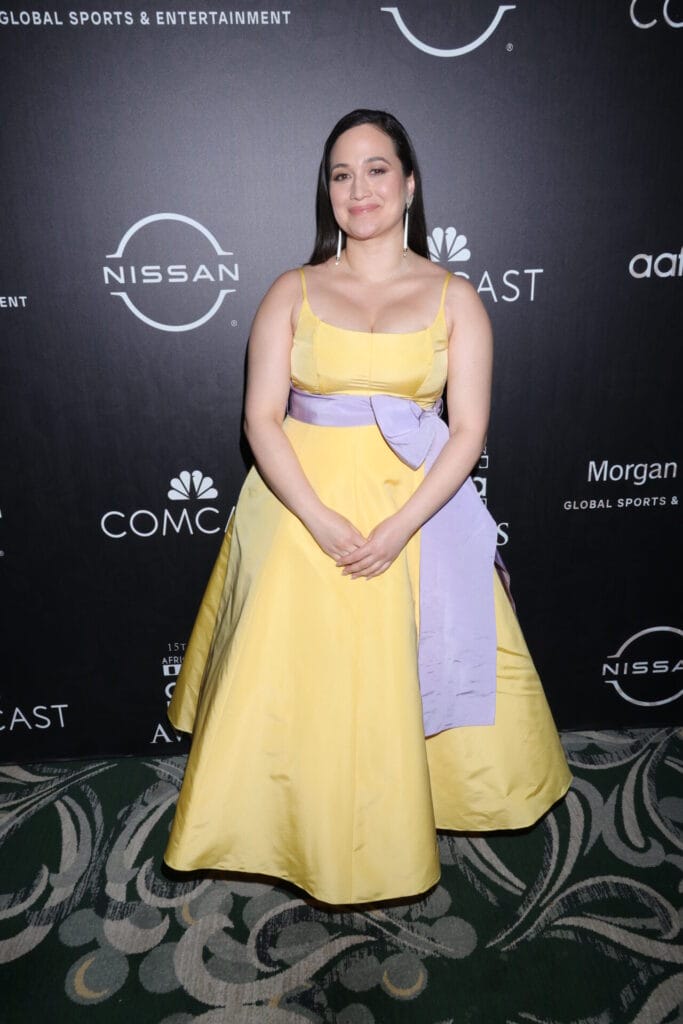
“I just am so touched to be holding this award in this room this evening,” she said with gratitude. “The African African American Film Critics Association — you all see the work. You see it without having it spelled out for you and I think we all are pretty familiar with that because it justifies what we’re doing on screen; the kind of stories we’re telling; the kind of women who are the backbones of our community and the way they hold themselves in the film that may read differently to a lot other people who are watching stories differently. I think it’s just incredible that at this point in film history, we have these kinds of stories told at this level.”
She continued to educate audiences by talking about the Reign of Terror and the Tulsa Massacre and how they both happened in 1921.”They happened within miles and days of each other and likely at the hands of the same people who did not want to see non-white people hold power or money or hold their communities up — but we do that for each other,” she said. “It’s in the zeitgeist now. We’re so happy that we can really claim and say that indigenous sovereignty goes hand in hand with Black liberation.”
Gladstone continued, “That’s the way that we forward together, and thank you so much for listening to every artist in this room for making the kind of work that has made me feel seen, even if it’s not directly pointed the lens back into the communities that I grew up in, I feel seen by your work and I expanded because of your artistry. I am just blessed to be here with you all so much… let’s also keep moving forward. Keep breaking down doors and expectations.”
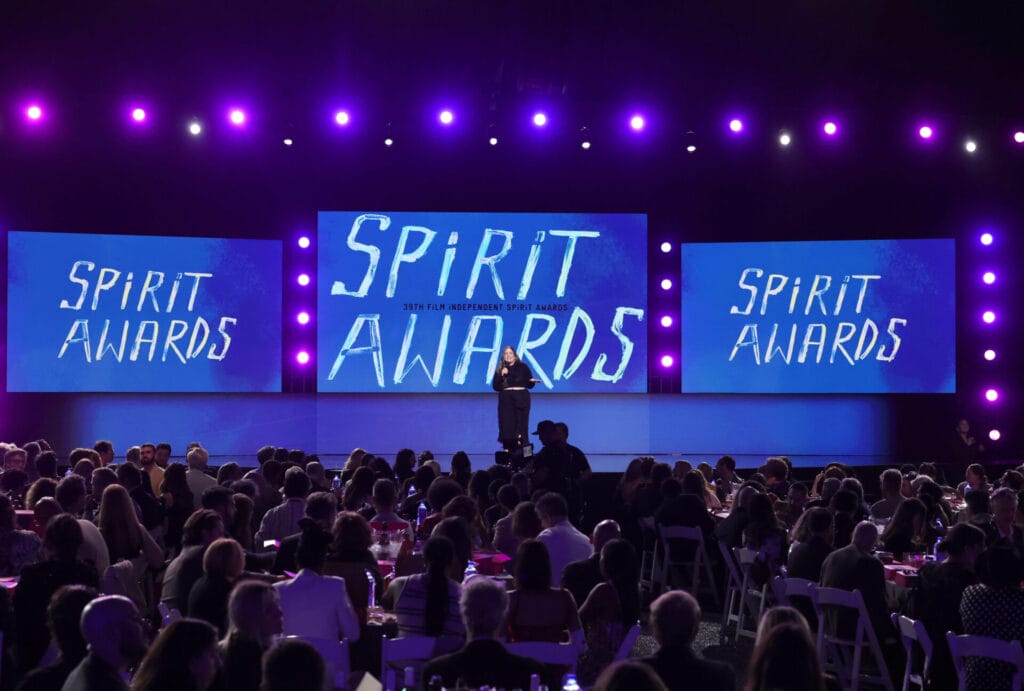
At the Spirit Awards hosted by Aidy Bryant, Gladstone served as the honorary chair of the ceremony and presented Kelly Reichardt with the Robert Altman Award for her film Showing Up. The two previously worked together on the 2016 film Certain Women. Domingo, as well as Joel Kim Booster, Emma Corrin, Hannah Einbinder, Noah Galvin, Stephanie Hsu, Zoe Lister-Jones, Trace Lysette, Natalie Morales, Ben Platt, and Andrew Scott, were among presenters — and some of them were nominees as well.
The Spirit Awards ceremony continued their non-gendered acting categories in the film and TV categories and LGBTQ allies were in full effect during this past week’s award season caravan. Nick Offerman, who starred in the much-talked-about episode of The Last of Us titled “A Long, Long Time” won at the Spirit Awards for Best Supporting Performance in a New TV Series.
He talked about how he enjoyed working with HBO, writers Neil Druckmann & Craig Mazin, and director Peter Hoar. He also thanked his co-star Murray Bartlett, who was also nominated in the category. “He planted the strawberries…and that’s not a euphemism.”
Joking aside, Offerman praised the team for having the “guts” to participate in the tradition of truly independent storytelling. During his acceptance speech, Offerman said “When homophobic hate comes my way and [asks] ‘Why do you have to make it a gay story?'” He answered, “Because we have questions like that. It’s not a gay story. It’s a love story, you a**hole!”
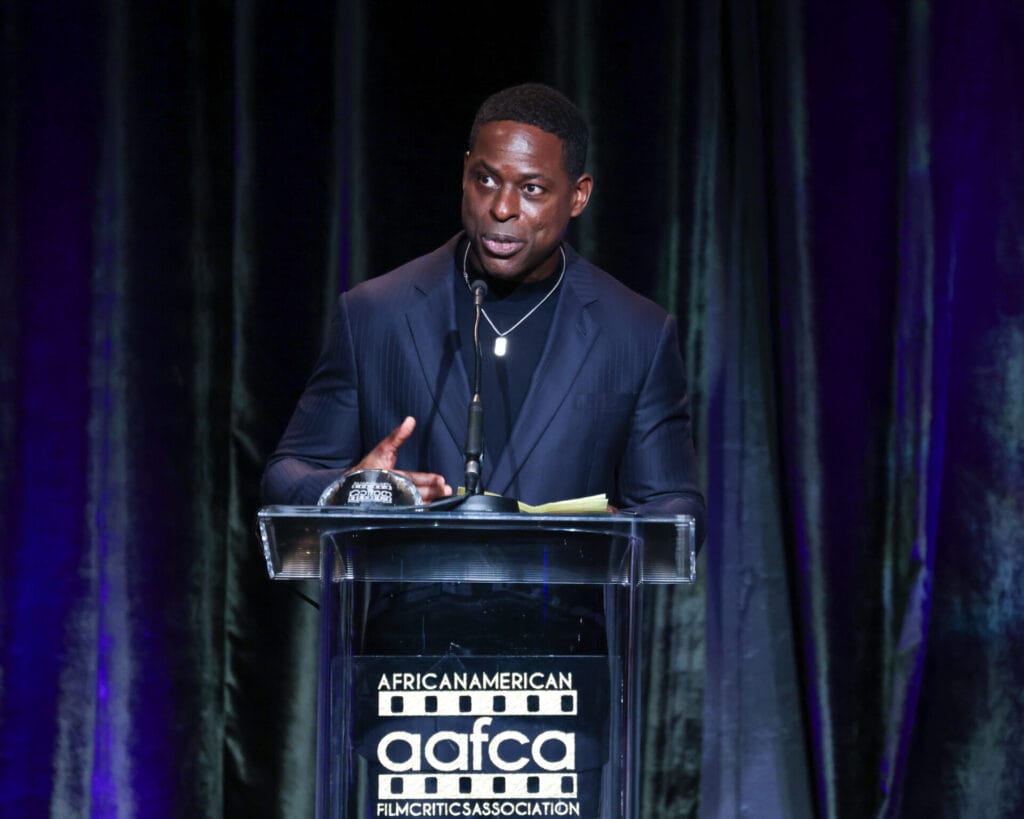
Sterling K. Brown, who plays an adult gay man just out of the closet in Cord Jefferson‘s American Fiction also advocated for the queer community at the AAFCA Awards. In his acceptance speech for Best Supporting Actor, he talked about being a heterosexual man playing a gay role and how queerness is perceived. “The age-old doctrine of loving the sinner and hating the sin felt like the most conditional kind of love; one where one could practice and oblige people and friends,” he said. “I’m here to tell you that that is not my ministry. My ministry is to love without limits.”
Brown, who is also nominated for an Oscar, continued, “I want to thank the LGBTQ community for receiving this performance with the love of which it was intended. Hopefully, you were able to see yourselves to some extent within it. Because I know after 47 years of life on this planet, I most definitely see myself in you.”













